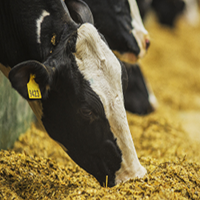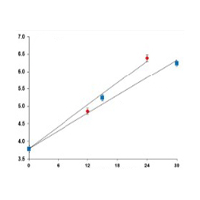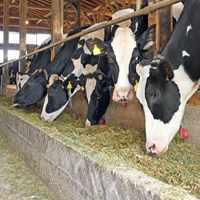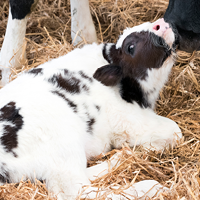



Each podcast contains highlights of ruminant research sponsored by Adisseo and presented during the 2021 virtual American Dairy Science Association (ADSA) Annual Meeting.
Highlights include what was researched and why, a brief summary of the findings, the conclusions drawn, and insights on how best to apply the results.

Non essential AA play an important role in early postpartum milk production and protein synthesis. Research results point to the importance of the supply of certain non essential amino acids for maximizing early postpartum milk production and protein synthesis. To maximize milk yields and components at the start of lactation, two factors are important. First, optimize a supply of essential AAs with a profile similar to casein through ration formulation with diverse protein sources and protected amino acids. Then ensure an adequate supply of certain non essential amino acids
Researchers explored the use of 15N as a biomarker to predict nitrogen use efficiency in the peripartum period. They found that 15N may have limited applicability as a biomarker to predict nitrogen use efficiency.
Features Dr. Lahlou Bahloul, Global Lead on Ruminant Support, Adisseo, for Aarhus University, Denmark, and INRAE. Dr. Brian Sloan, Global Director of Ruminant Amino Acids and Protected Nutrient Business, Adisseo. Dr. Dan Luchini, Head of Ruminant R&D, Adisseo.
373 Abomasal amino acid infusions in postpartum dairy cows.
374 Effect of abomasal amino acid infusions on metabolism in postpartum.

Researchers compared the effects of supplementing sodium butyrate, monensin, or both to post-weaned heifers. The addition of either additive conferred positive effects in terms of greater dry matter intake, body weights and lower coccidia oocysts compared to the use of no additive.
Features Tess Stahl, Graduate Student, University of New Hampshire.Keith Klanderman, Business Director – Ruminant Specialties and Solutions, Adisseo. Dr. Dan Luchini, Head of Ruminant R&D, Adisseo.

Two studies were conducted to investigate amino acid requirements in sheep. The first study found that supplementation of rumen-protected methionine to high and low crude protein diets (14.8% and 16.6%) in Lacaune dairy ewes during early lactation did not alter intakes, milk yield or milk protein. Increasing crude protein also did not improve performance, but an excess metabolizable protein supply could explain why there was no milk protein response in methionine balanced diets.
The second study found that methionine supplementation at 2.5% and 2.7% of metabolizable methionine/PDI to dairy ewes increased milk protein content compared to control with 1.8%. Supplementing at 2.5% increased milk protein content the most, suggesting that the dietary metabolizable methionine recommendation of 2.5% in dairy cows may be extended to dairy ewes.
Features Dr. Sergio Calsamiglia, Department of Animal and Food Sciences, Universitat Autonoma de Barcelona, Spain. Dr. Brian Sloan, Global Director of Ruminant Amino Acids and Protected Nutrient Business, Adisseo. Dr. Dan Luchini, Head of Ruminant R&D, Adisseo
P483 Metabolizable methionine balanced diets improved Lacaune dairy ewe performance.

The plasma free-amino acid (AA) dose-response method has now become the gold standard for estimating the bioavailability of AA in rumen protected AA supplements. Its robust but simple methodology consistently delivers the level of accuracy and reliability that’s needed. Refinements and improvements have reduced experimental variation while increasing accuracy and precision.
Features Dr. Nancy Whitehouse, Research Scientist, University of New Hampshire. Dr. Brian Sloan, Global Director of Ruminant Amino Acids and Protected Nutrient Business, Adisseo. Dr. Dan Luchini, Head of Ruminant R&D, Adisseo.

Methionine influences the synthesis of fatty acids in the mammary gland resulting in improvements in milk fat yield. In full lactation cows producing 50kgs/day, feeding Smartamine® M, not only improved milk protein but also milk fat percent (4.13% vs 3.87%) independently of the metabolizable energy level of the diet. The increase in milk fat was mediated through an increase in preformed and monounsaturated fatty acids while decreasing polyunsaturated fatty acids. Further analysis is ongoing to better understand the mechanism of action of methionine on milk fat synthesis..
Features Jorge Carneiro, Graduate Student, Universidade Federal do Parana, Brazil. Dr. Brian Sloan, Global Director of Ruminant Amino Acids and Protected Nutrient Business, Adisseo. Dr. Dan Luchini, Head of Ruminant R&D, Adisseo

The effect of supplementing low-forage dairy diets (28% forage) with rumen protected lysine and methionine to balance amino acid levels was evaluated. Supplemental amino acids did not alter milk fat and protein but had beneficial effects on milk yield and mammary health, increasing yields by +0.6 kg/d and decreasing risk of mastitis (0.39 times lower).
Features Marcelo Abreu, Graduate Student, University of California – Davis. Dr. Brian Sloan, Global Director of Ruminant Amino Acids and Protected Nutrient Business, Adisseo. Dr. Dan Luchini, Head of Ruminant R&D, Adisseo

Research shows the uterine immunometabolic status of dairy cows improves when a rumen protected methionine is fed during the peripartum period. The abundance of mRNA in inflammatory and metabolic pathways were favorably altered, indicating a beneficial effect of methionine on immune responses and metabolism during the challenging transition period and early lactation. This favors a uterine environment for successful breeding…
Features Anne Rosi Guadagnin, Graduate Student, University of Illinois. Dr. Brian Sloan, Global Director of Ruminant Amino Acids and Protected Nutrient Business, Adisseo. Dr. Dan Luchini, Head of Ruminant R&D, Adisseo.

Mycotoxins reduce rumen performance, according to University of New Hampshire research. Mycotoxin deactivators increase the production of beneficial metabolites and, thus, increase cow health and performance.
The effects of the mycotoxin deactivator UNIKE® Plus was investigated on rumen parameters in cows fed mycotoxin-contaminated dried distillers grains. While mycotoxin impaired rumen volatile fatty acid production and the microbial population, these parameters were restored by the mycotoxin deactivator, resulting in a healthier rumen..
Features Dr. Nancy Whitehouse, Research Scientist, University of New Hampshire. Guilherme Bromfman, Regional Category Manager – Mycotoxins N&CA, Adisseo. Dr. Dan Luchini, Head of Ruminant R&D, Adisseo

Supplemental methionine modulated liver protein abundance and enzyme activity, stabilizing metabolism and making cows less susceptible to the metabolic disruptions caused by heat stress.
Features Dr. Danielle Coleman, Ruminant R&I Science Manager with Adisseo; research was conducted while a graduate student at the University of Illinois. Dr. Brian Sloan, Global Director of Ruminant Amino Acids and Protected Nutrient Business, Adisseo. Dr. Dan Luchini, Head of Ruminant R&D, Adisseo.